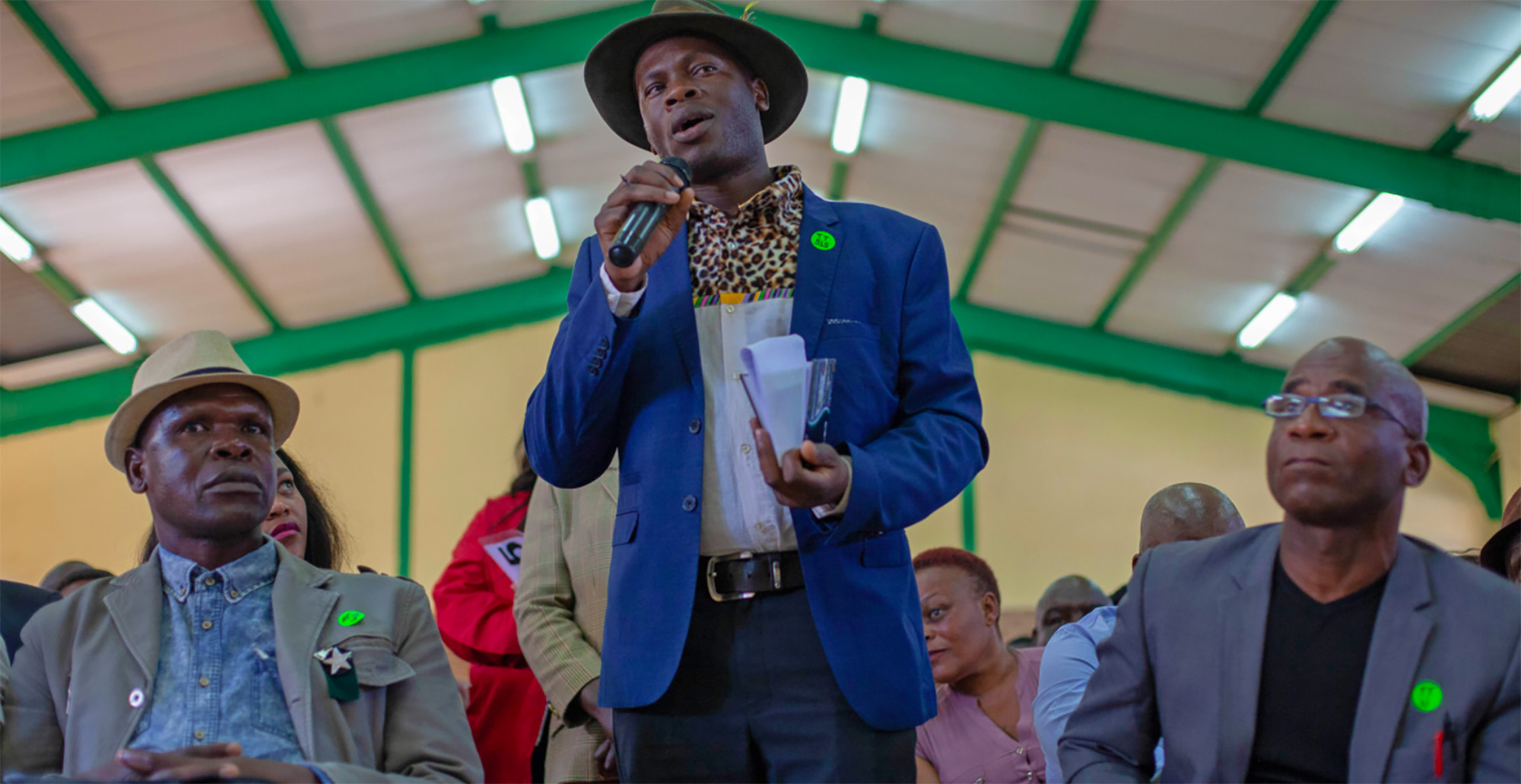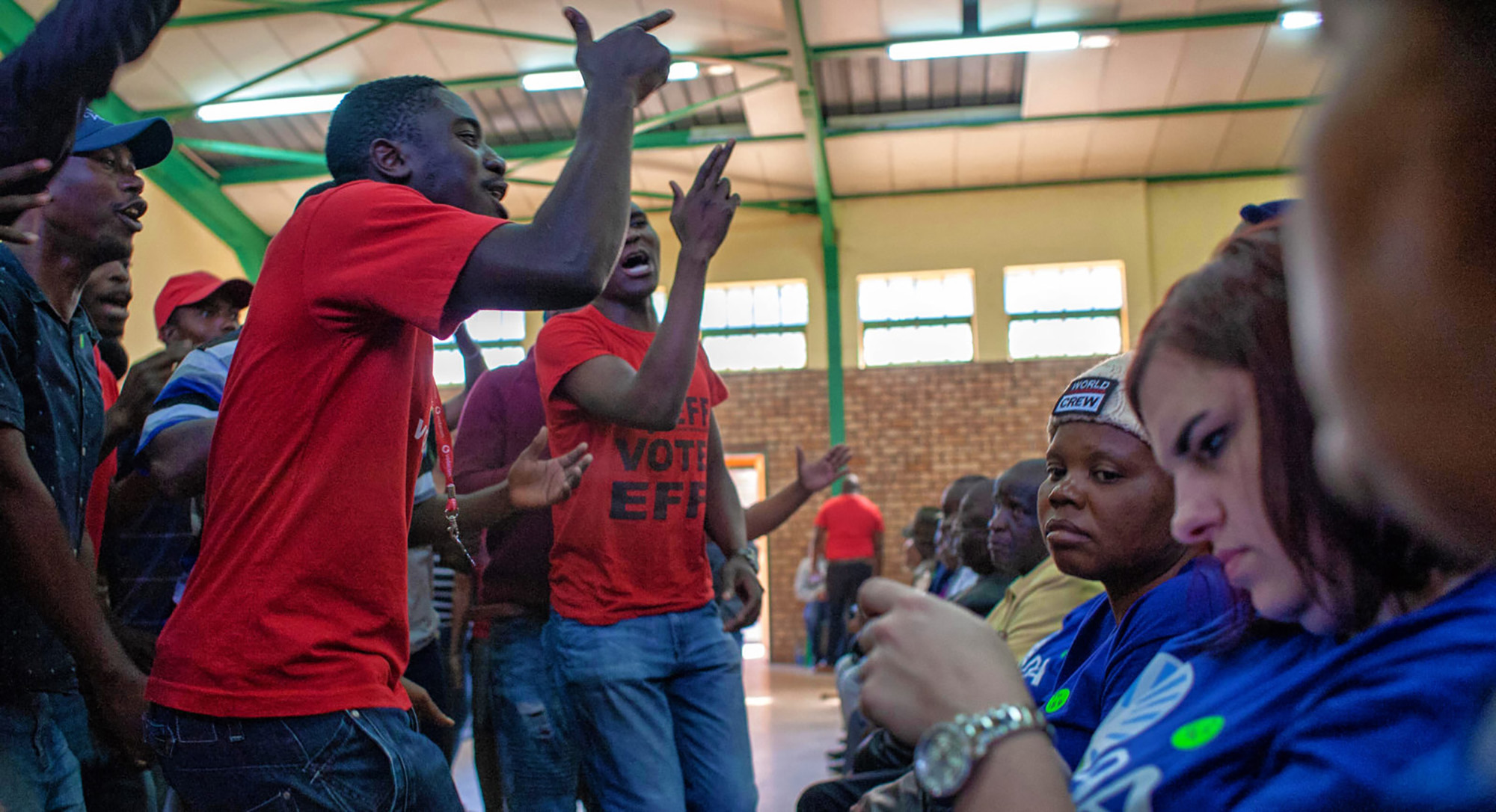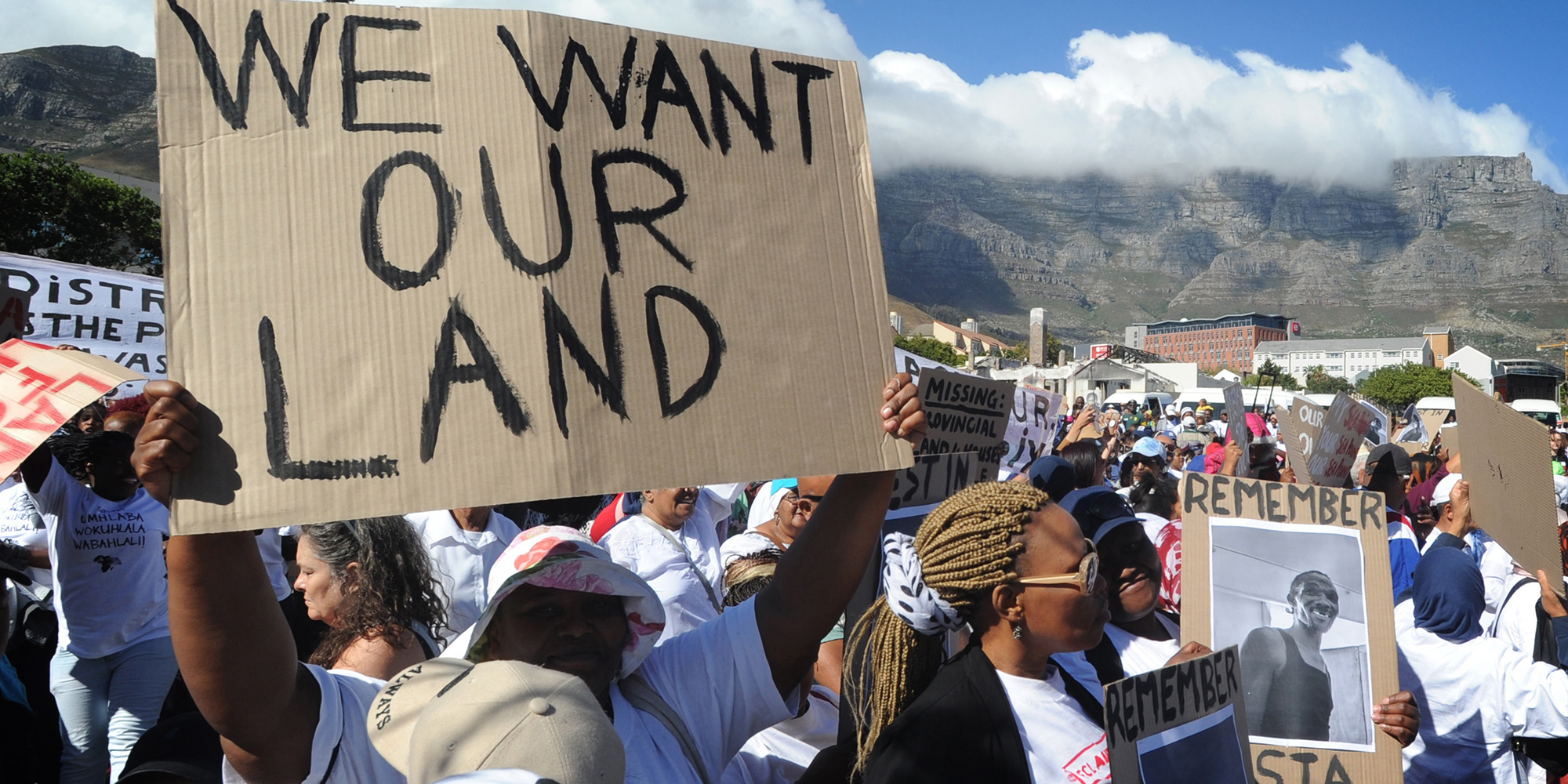On Wednesday 27 March, the National Assembly – on the back of ANC numbers in the House – approved the Expropriation Bill as amended by the National Council of Provinces (NCOP) with a vote of 205 in favour and 108 against.
It was a short process to get here – a public committee meeting on Tuesday to approve the changes, followed by Wednesday’s vote a day before the National Assembly rises for a constituency period ahead of elections.
This approval vote marks the end of a 16-year journey that began in 2008 to replace the apartheid-era law still on the statute books.
It comes against the backdrop of often heated moments as this legislation became enmeshed in the 2018 to 2021 process to amend the Constitution to allow compensationless expropriation – a process that itself was steeped in ANC factional dynamics pushed by the so-called “radical economic transformation” grouping.
 A man speaks against changing the Constitution to allow for expropriation without compensation at the Section 25 hearings in Limpopo, South Africa on 28 June 2018. (Greg Nicolson)
A man speaks against changing the Constitution to allow for expropriation without compensation at the Section 25 hearings in Limpopo, South Africa on 28 June 2018. (Greg Nicolson)
The National Health Insurance (NHI) Bill had a similarly controversial passage through Parliament, with last-minute calls from organised business for President Cyril Ramaphosa to refer the legislation back to Parliament over constitutional concerns.
The NHI Bill was passed in December 2023, and, like the expropriation legislation, could still head to court.
Threats of litigation
The DA, Freedom Front Plus and IFP want the President to refer the Expropriation Bill back to Parliament or to the Constitutional Court for a decision on its constitutionality.
The EFF said the Bill would “protect the current landholders – the settlers and colonialists”, while the ACDP also spoke against it.
IFP MP Sanele Zondo pointed to irregularities in obtaining provincial mandates in the NCOP, adding that while the IFP supported meaningful land reform as a part of transformation, this legislation was not it.
FF+ MP Philip van Staden said there was enough land available for redistribution, but that government red tape and incompetence were a stumbling block.
DA MP Isaac Seitlholo said the legislation was “expropriation through the backdoor” packaged as land reform, and would be opposed – as a first step – with a letter to the President not to sign the law into force.
The ANC, in its declarations in the House, supported the Expropriation Bill, saying it was based on best international practice.
ANC MP Timothy Mashele said it was a “balanced perspective” and would ensure fair processes.
Passing the Bill “should happen as a matter of yesterday”, he said, adding that people were waiting for land to be expropriated so government could build houses and health facilities
Much like the ANC speakers, a statement by trade union federation Cosatu welcomed the passage of the expropriation legislation as a “historic victory for the working class, the dispossessed and the downtrodden” – and a tool to accelerate land reform.
‘Nil compensation’
The Expropriation Bill, the third iteration of this legislation since 2008, allows expropriation for public purpose in the public interest and allows for “nil compensation” in a handful of categories, including land held for speculation, abandoned land and state land.
“The parliamentary legal adviser recorded that the amendments indeed did not render the Bill unconstitutional or procedurally flawed,” said the public works committee report adopted on Tuesday.
“The majority of the committee was convinced that the amended Bill puts in place uniform administrative procedures that are compliant with the constitutionally protected rights of owners and holders of rights.”
This is a far cry from the often heated discussion when, in 2008, the first version of the Bill was withdrawn after parliamentary legal advisers pointed out that not allowing recourse to the courts was unconstitutional.
Read more in Daily Maverick: Contested Expropriation Bill closer to becoming law, but don’t hold your breath
 EFF supporters sing in front of DA supporters in Limpopo, South Africa at hearings on changing Section 25 of the Constitution to allow for land expropriation without compensation on 28 June 2018. (Photo: Greg Nicolson)
EFF supporters sing in front of DA supporters in Limpopo, South Africa at hearings on changing Section 25 of the Constitution to allow for land expropriation without compensation on 28 June 2018. (Photo: Greg Nicolson)
It took until 2015 to reintroduce a revised version. It was passed, but in 2017, then president Jacob Zuma returned it to Parliament over concerns about a lack of public consultations.
Ultimately, the Bill was withdrawn amid political jockeying ahead of the 2017 ANC national elective conference at Nasrec, which at the last minute adopted compensationless expropriation without endangering food security or economic activity.
Between 2018 and late 2021, calls for a constitutional review of S25 of the Constitution – the property clause – to make explicit compensationless expropriation dominated.
In public hearings, expropriation without compensation emerged as shorthand for social justice.
But the toenadering between the ANC and EFF shattered in late 2021, and that meant the required two-thirds majority needed for a constitutional amendment was out of reach when the vote was held on 7 December 2021.
The focus returned to the Expropriation Bill and it was adopted on 28 September 2022 on the back of ANC numbers.
Read more in Daily Maverick: ANC declaration on land highlights RET retreat, but offers few solid solutions
The current version of the expropriation legislation was introduced in Parliament in October 2020, allowing “nil compensation” in the expropriation of, among other categories, state land, abandoned land or land held for speculation.
The NCOP process was completed by December 2023 but then delayed repeatedly in order to obtain provincial mandates. It was finally adopted with the support of all provinces except the DA-run Western Cape on 19 March 2024.
Wednesday’s adoption of the NCOP-amended Expropriation Bill means it will now go straight to the presidential in-tray for signature on to South Africa’s statute books. DM




 EFF supporters sing in front of DA supporters in Limpopo, South Africa at hearings on changing Section 25 of the Constitution to allow for land expropriation without compensation on 28 June 2018. (Photo: Greg Nicolson)
EFF supporters sing in front of DA supporters in Limpopo, South Africa at hearings on changing Section 25 of the Constitution to allow for land expropriation without compensation on 28 June 2018. (Photo: Greg Nicolson) 